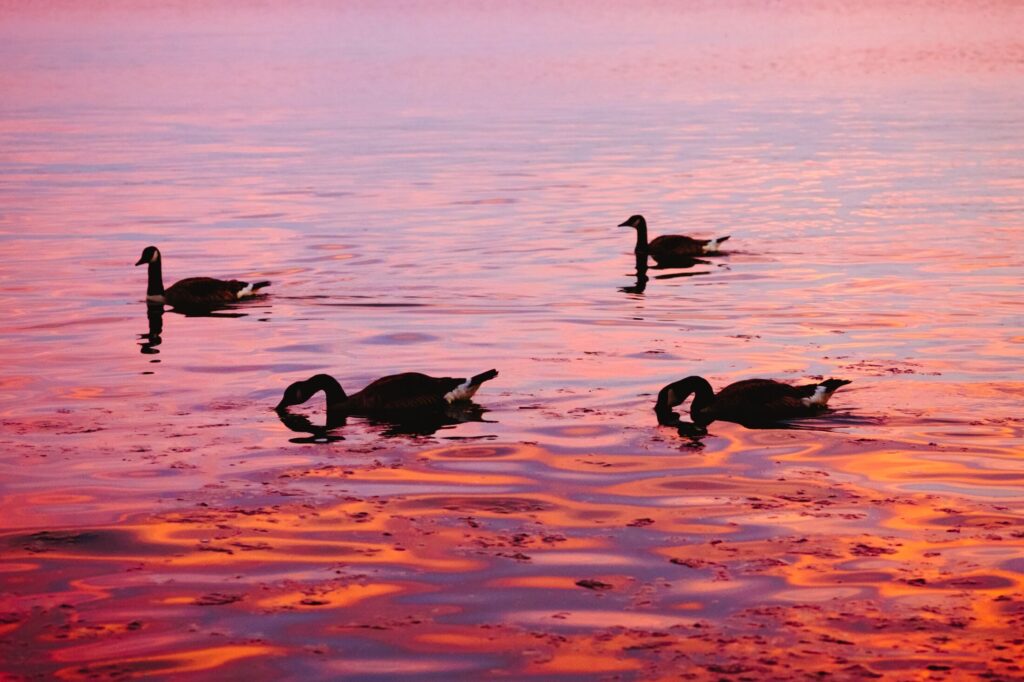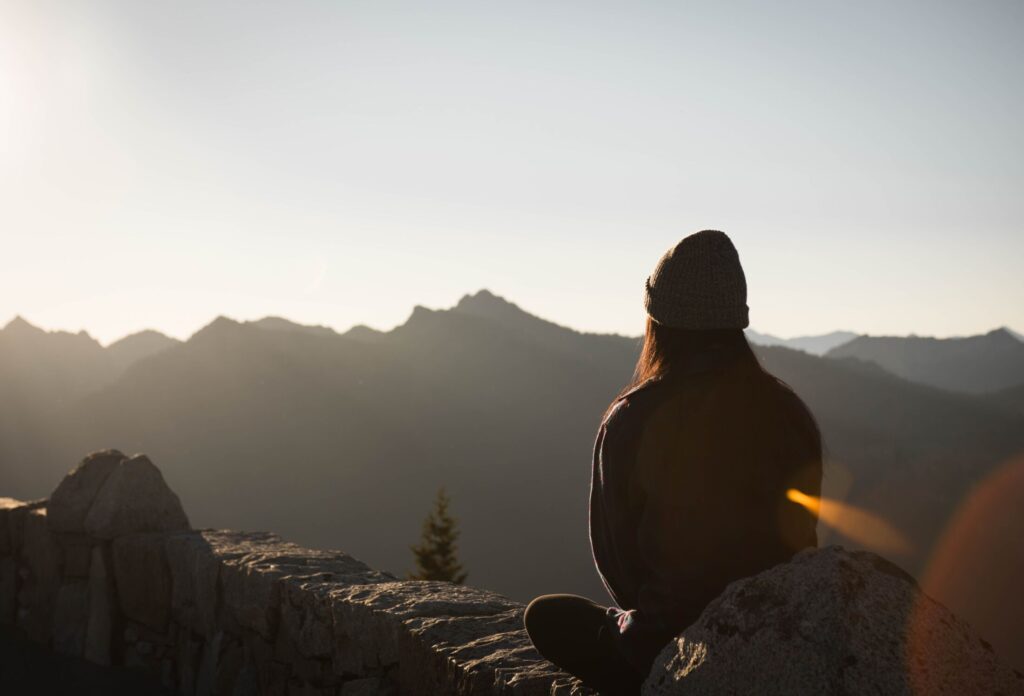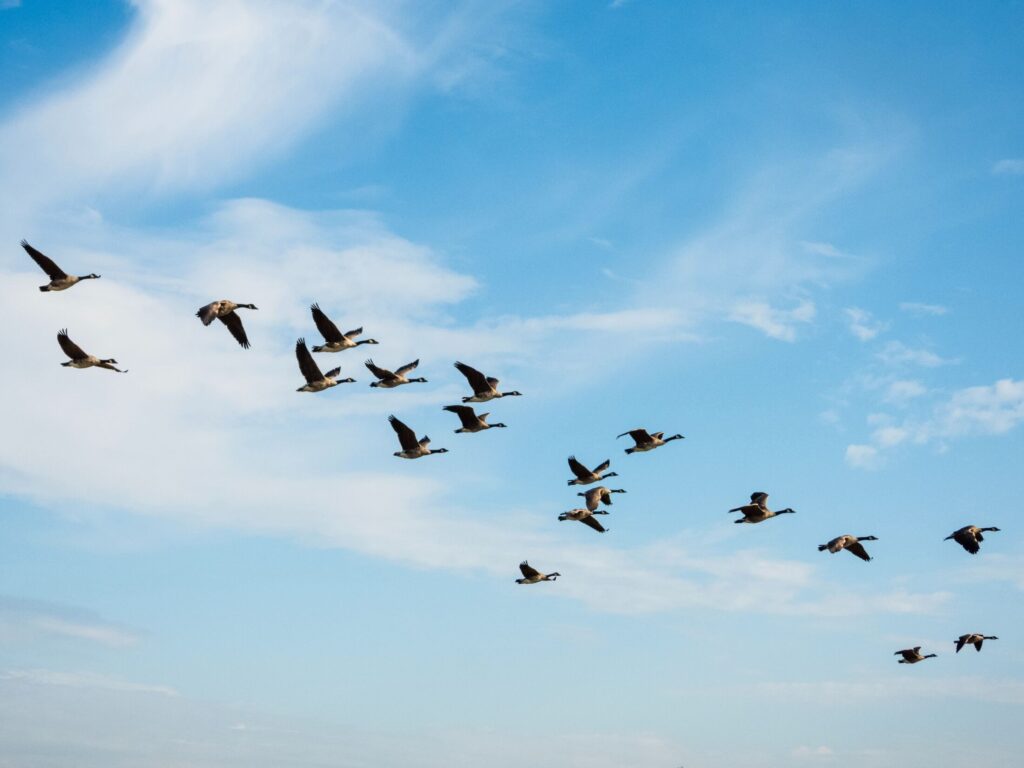
Photo by Elvir K
One of the things I appreciate about the process of mindfulness training and living a more mindful life is the way we can learn so much about our human life when we engage the arts. The meditative practices are foundational and essential in this journey, but there is more to mindfulness than breathing and neuroscience. Fresh perspectives, inspiration, and new insights pour forth from the arts as well, when we contemplate them with a mindful lens.
Take Mary Oliver’s poetry, for example. Here is a poem I met many years ago and continue to learn from and treasure:
Mary Oliver – Wild Geese
You do not have to be good.
You do not have to walk on your knees
for a hundred miles through the desert, repenting.
You only have to let the soft animal of your body
love what it loves.
Tell me about despair, yours, and I will tell you mine.
Meanwhile the world goes on.
Meanwhile the sun and the clear pebbles of the rain
are moving across the landscapes,
over the prairies and the deep trees,
the mountains and the rivers.
Meanwhile the wild geese, high in the clean blue air,
are heading home again.
Whoever you are, no matter how lonely,
the world offers itself to your imagination,
calls to you like the wild geese, harsh and exciting–
over and over announcing your place
in the family of things.
You do not have to be good? Really?! I believe I’ll be practicing with this opening line for the rest of my life.
Like most people I know, I’m deeply conditioned to want to be good: to be very, very good. To get all my tasks done to the highest standard. To respond promptly and fully to every request. To do everything I do with excellence. To help others…well to help everyone. That’s what being “good” seems to mean to me. It seems to stem mostly from family expectations I’ve internalized.
What does being good mean to you? Is that idea helpful? Can it be overwhelming? Is it right and important up to a point, but can it push into some kind of over-doing (over-gooding)?
Do you have a story that helps explain why you are the way you are, too? Culture, history, family, oppression, past trauma – we live lives that are so deeply conditioned by what came before. How do these forces work on you and your sense of goodness, of being enough? There is more to the mindfulness journey than just “be here now.” But here we are now, so maybe we can excel, take care of others, and take care of ourselves without this heavy burden of always being so very good.
You do not have to walk on your knees
for a hundred miles through the desert, repenting.
Where can this relentless energy of always being good lead us? To the kind of self-sacrifice Mary Oliver is speaking about here? Putting your own needs last? The mindful self-compassion work I’ve done so far helps me see how critical it is for me to learn to include myself fully in my circle of compassion.
You only have to let the soft animal of your body
love what it loves.
It’s been so surprising to me to learn how transformational and important embodiment is: basically, it’s learning to feel what I feel through my body and not just my busy mind.
Feelings in my body often tell me so much sooner how I’m doing. If I’m upset or struggling or stressed, my gut and the tension in my shoulders aren’t fooled by my mental habit of saying, “I’m fine, it’s okay, just keep going.”
Mindfulness training has a strong emphasis on the body. To settle into the breath and into the body can be a place of profound stillness and restoration. It can also be challenging –much can be stored in the body from past hurts and difficulties. Great care, kindness, and support is a help as we land back in the bodies we can end up estranged from.
How is your journey into embodiment going? What are you finding helpful? What are you finding challenging as you tune into your body more?
Tell me about despair, yours, and I will tell you mine.
We need each other. And we all feel difficult feelings. All of us. As I’ve learned to open up to dear friends, teachers, therapists, it’s been so healing for me. And it’s been such an honor when I have the privilege of listening to the despair of others: deep listening and deep sharing rather than advice or some kind of wisdom from somewhere. We need each other and we heal together when it’s safe to open up.

Photo by Noorulabdeen Ahmad
Meanwhile the world goes on.
Meanwhile the sun and the clear pebbles of the rain
are moving across the landscapes,
over the prairies and the deep trees,
the mountains and the rivers.
These lines mirror recent research on awe. It helps us so much to open up to a broader perspective. All of life is happening on a vast planet within an unimaginably vast universe. A troubled planet too, yes, as climate change is no joke. But ours is also a vast and beautiful planet. When I look out the window and gaze at the distant hills and the sky, something shifts, softens, and opens. It doesn’t need to be a stunning vista: the sparrow under the picnic table, the fresh green leaves on the sidewalk tree. Connecting with the natural world — whatever’s right here — can help create space.
Meanwhile the wild geese, high in the clean blue air,
are heading home again.
And we aren’t the only species here. So easily we forget the great diversity of life.
I love the practice we emphasize in mindful self-compassion called common humanity – reminding ourselves deeply that we aren’t the only one with this issue or that problem. So many other people share a similar concern and are struggling with a similar challenge. When I tune into this it’s surprising how much my worry or stress seems to lighten and soften. It’s not just me! What a relief.
Thinking of the wild geese high above flying home, I can take this a step further. I can hold an even broader perspective than being part of the vast diversity of humanity: I am part of the incredible diversity of all living things on earth, too.
Whoever you are, no matter how lonely,
the world offers itself to your imagination,
calls to you like the wild geese, harsh and exciting–
over and over announcing your place
in the family of things.
Another thing I’ve come to appreciate so deeply about the mindfulness training we do together is that we create a safe space for one another. We can be real about the fact that we’re all of us lonely sometimes, all of us despairing sometimes – that all of us struggle. And that this is normal. We suffer more for the pretense that everything’s fine all the time. What a relief to put that down. And when we put down the pretense that everything’s all fine we open up. We listen.
And when we listen, maybe it’s as Mary Oliver says here: the world calls to us. It’s not always easy. “Harsh and exciting” isn’t always gentle. Wrenching changes may be called for. But when we open up it becomes more possible to find our place. To find our path. To remember the unique contribution each of us can make to the collective story.
Isn’t it amazing that while we are comforted by our common humanity and our shared experience with the rest of nature we are also each of us completely unique?
I hope you can take some comfort today in your unique gifts and strengths and feel your place in the family of things. It’s not an easy journey, this being a person, but we do have so many supports. Do you find this powerful poem from the gifted Mary Oliver a comfort and revelation, too?
Wishing you well,
Tim

Photo by Nick Fewings
This article was part of our Practice Letter newsletter. If you’d like to receive this monthly publication in your inbox, please sign up here.

